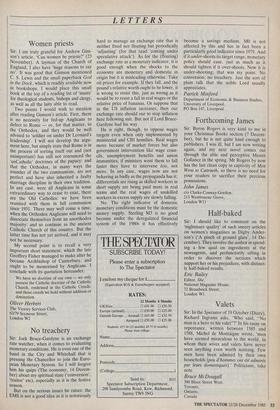No treachery
Sir: Jock Bruce-Gardyne is an exchange rate watcher, when it comes to evaluating monetary conditions. He is even one of the band in the City and Whitehall that is pressing the Chancellor to join the Euro-. pean Monetary System. So I will forgive him his quips (The economy, 14 Decem- ber) about my spiritual state (`conversion', `traitor' etc), especially as it is the festive season.
But on the serious issues he raises: the EMS is not a good idea as it is notoriously
hard to manage an exchange rate that is neither fixed nor floating but periodically 'adjusting' (for that read 'coming under speculative attack'). As for the (floating) exchange rate as a monetary indicator, it is good enough when the shocks to the economy are monetary and domestic in origin but it is misleading otherwise. Take oil prices for example. If they fall, and the pound's relative worth ought to be lower, it is wrong to resist this, just as wrong as it would be to resist a fall in real wages or the relative price of bananas. Or suppose that in the US inflation increases; then our exchange rate should rise to stop inflation here following suit. But not if Lord Bruce- Gardyne had his way.
He is right, though, to oppose wages targets even when only implemented by ministerial and CBI homilies. Real wages move because of market forces but also government intervention like wage coun- cils, unemployment benefits and union immunities; if ministers want them to fall faster they have to intervene less, not more. In any case, wages now are not behaving as badly as the propaganda has it; differentials are rising as skilled workers in short supply are being paid more in real terms and the real wages of unskilled workers in excess supply are slowly falling.
No. The right indicator of domestic monetary conditions must be the domestic money supply. Sterling M3 is no good because under the deregulated financial system of the 1980s it has effectively
become a savings medium. MO is not affected by this and has in fact been a particularly good indicator since 1979. And if it under-shoots its target range, monetary policy should ease, just as much as it should tighten if it over-shoots. Now it is under-shooting; that was my point. No conversion; no treachery. Just the sort of plain talk that the noble Lord usually appreciates.
Patrick Minford
Department of Economic & Business Studies, University of Liverpool, PO Box 147, Liverpool


















































































 Previous page
Previous page